News
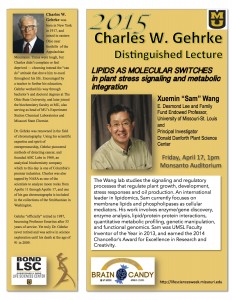
April 9, 2015
Life Sciences Week preview: Doing more with less
A simple virtue lies at the heart of Xuemin (Sam) Wang’s research: thrift. “A good way to think of it is how to increase output without demanding more inputs,” Wang said. Wang, the E. Desmond Lee and Family Fund endowed professor at the University of Missouri-St. Louis and a principal investigator at the Donald Danforth Plant Science Center, studies plant membrane lipids. His lab is focused on understanding the relationship between oil production and plant stresses such as drought and nutrient deficiency. Wang will speak during the 31st annual Missouri Life Sciences Week, a yearly celebration of MU’s…
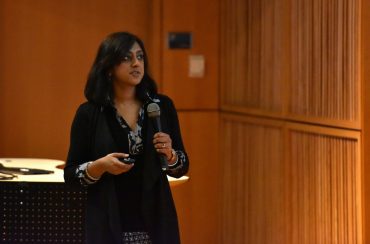
March 31, 2015
Scientists dig into the epigenetics of cancer
Joya Chandra, associate professor of pediatrics at The University of Texas MD Anderson Cancer Center, explains the epigenetics of pediatric cancers at the 2015 MU LSSP Symposium on epigenetics on Sunday, March 15.//photo by Caleb O’Brien/Bond LSC The evolving science of epigenetics is shaking up how scientists and doctors think about cancer. At the 11th annual University of Missouri Life Sciences & Society Program symposium, scientists, historians and philosophers explored the epigenetic theme. On its final day, two researchers spoke about how cancer and epigenetics intersect. Epigenetics involves changes to how genes work that do not…

March 30, 2015
Translating soybean cyst nematode research
Roger Meissen/Bond Life Sciences Center – These soybean roots show some nematode cysts. The small, white circles are the hardened body of the nematodes and form when the nematode attaches itself to the root to create a feeding cell. Beneath a North Carolina field in 1954, a tiny worm inched its way through the soil and butted against a soybean root. The worm pierced the plant, slipped inside and inserted a needle-like appendage into a cell. It pumped a mixture of proteins into the root cell and waited for the potent blend to take effect on…
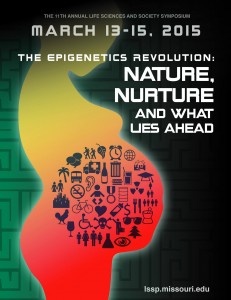
March 12, 2015
Five things you wanted to know about epigenetics (But were afraid to ask)
What the heck is it, anyway? Epigenetics involves changes in how your genes work. In classical genetics, traits pass from generation to generation in DNA, the strands of genetic material that encode your genes. Scientists thought alterations to the DNA itself was the only way changes could pass on to subsequent generations. So say you lost a thumb to a angry snapping turtle: Because your DNA hasn’t changed, your children won’t be born with smaller thumbs. Classic. Things get way more complicated with epigenetics. It turns out that some inherited changes pass on even though they…
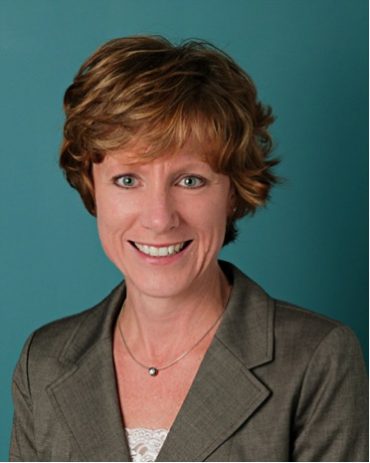
March 11, 2015
Don’t stress, your kids will thank you
LSSP Symposium highlights epigenetics of the womb and how parental stress can change genetic makeup Could a stressful day during pregnancy change the future of a developing child nestled in the womb? Experts in the epigenetic research field are saying yes. This weekend the 11th annual Life Sciences and Society Program will kick off “Epigenetic Revolution: Nature, Nurture and What Lies Ahead,” bringing experts on environmental influences on offspring to the stage. Two speakers will focus their talks on the period of time developing mammals spend in the womb and what factors could trigger changes in their genetics. Tracy Bale,…
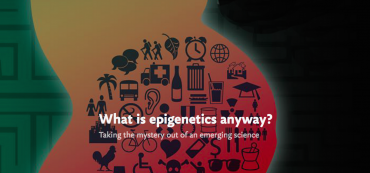
March 6, 2015
Introducing the 11th Annual LSSP topic: The Epigenetic Revolution
To introduce our 11th Annual Life Sciences and Society Program, The Epigenetics Revolution: Nature, Nurture and What Lies Ahead that runs at the University of Missouri March 13-15, we figured it would be nice to define the term epigenetics. Spoiler: It’s amazing and it could change everything. According to Merriam-Webster Dictionary, epigenetics is “the study of heritable changes in gene function that do not involve changes in the DNA sequence.” Let’s break that down. We can inherit something that changes what our genes do, but don’t actually change the code of our DNA. So what sort of things do genes do? It…
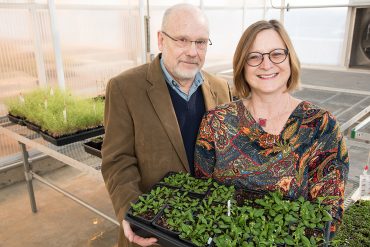
Feb. 12, 2015
Harm and response
Bond LSC’s Jack Schultz and Heidi Appel hold model Arabidopsis plants used in many of their experiments. Roger Meissen/Bond LSC We often think of damage on a surface level. But for plants, much of the important response to an insect bite takes place out of sight. Over minutes and hours, particular plant genes are turned on and off to fight back, translating into changes in its defenses. In one of the broadest studies of its kind, scientists at the University of Missouri Bond Life Sciences Center recently looked at all plant genes and their response to…
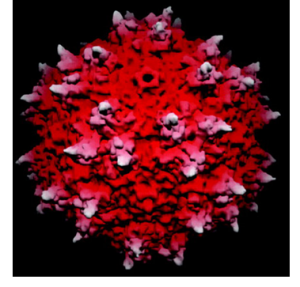
Feb. 12, 2015
Big discoveries come in little (capsid) packages
Adeno-associated virus type 2 at 3.0 A (xie, et al, Proc Natl Acad Sci U S A. 2002; 99:10405-10.) Courtesy David Pintel It’s an understatement to say viruses are small. But an average virus dwarfs the diminutive variety known as parvoviruses, which are among the most minuscule pathogens known to science. Tucked inside a protective protein shell, or capsid, parvoviruses contain a single DNA strand of about 5,000 nucleotides. If parvo’s genetic material is like an hour-long stroll around your neighborhood, a bigger virus like herpes is equivalent to walking from St. Louis to Columbia, Missouri.
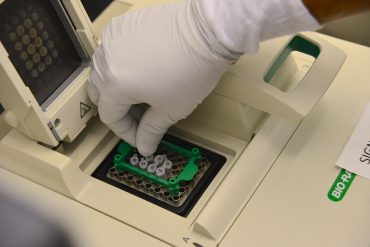
Jan. 14, 2015
Parkinson’s “trash pick-up problem”
Protein specimens are prepared here in a Bond Life Sciences lab. Bond LSC’s Mark Hannink recently identified a protein pathway could be useful in restoring mitochondrial recycling in certain cells, a problem that leads to familial Parkinson’s Disease. It’s as if your recycling man quit his job and never came back. Bags pile up to unexpected heights as waste continues to be generated and brought out to the curb. Day after day, the waste builds up as no one comes to pick them up. For individuals with Parkinson’s disease, an accumulation of waste causes specific brain cells…
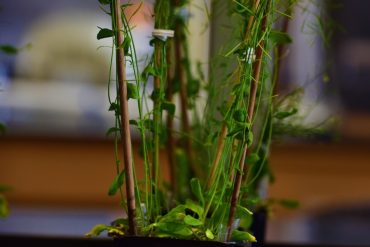
Nov. 20, 2014
“Mutant seeds” blossom in the pollen research field
A mutant arabidopsis model nearing pollination. Mutant arabidopsis models under lamps in Shuqun Zhang’s lab. Three-month-old mutant arabidopsis models are used to study the function of pollen. The thought of pollen dispersed throughout the air might trigger horrific memories of allergies, but the drifting dander is absolutely essential to all life. Science has long linked this element of reproduction with environmental conditions, but the reasons why and how pollen functions were less understood. Now lingering questions about the nuanced control of plants are being answered. “Pollen is a very important part of the reproductive process and…
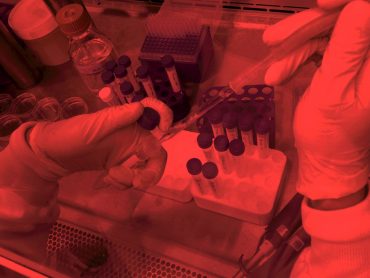
Oct. 9, 2014
The only thing you need to read about Ebola today: An expert Q&A
Jingyou Yu, a graduate student, does cell surface staining in Shan-Lu Liu’s virology lab. The staining illuminates cell marker expressions in experiments that deduce how viruses spread once they are contracted. | Paige Blankenbuehler News headlines seem to feverishly spread as if they were a pandemic of the brain. Ebola hemorrhagic fever has been the most talked about disease of the year, appearing in thousands of headlines across the world since May. Through the noise of misinformation and sensationalism, fundamental information about the pandemic becomes harder to distinguish. In an interview with Decoding Science on Tuesday, Shan-Lu Liu, MD,…
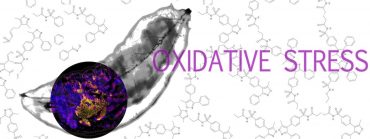
Oct. 1, 2014
The search for oxidative stress treatment continues
A yellow light indicates oxidant production in the tissue of a migrating fly larva. Source: Tobias Dick, German Cancer Research Center | Illustration by Paige Blankenbuehler University of Missouri research characterizes a novel compound By Paige Blankenbuehler Your body has an invisible enemy. One that it creates all on it’s own called oxidative stress, long thought of as an underlying cause of some of humanity’s most insidious diseases – cancer, Alzheimer’s, Parkinson’s Disease, cardiovascular disease and diabetes. Every day, our bodies are exposed to harmful free radicals known as reactive oxygen species as a result of our…